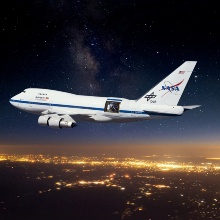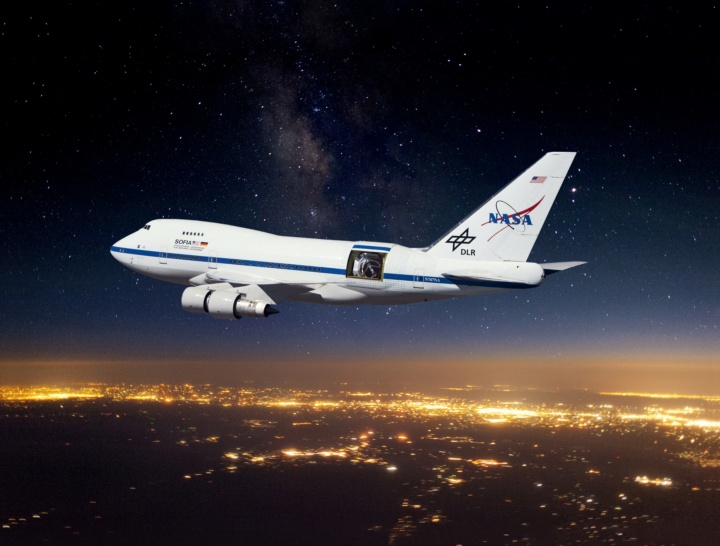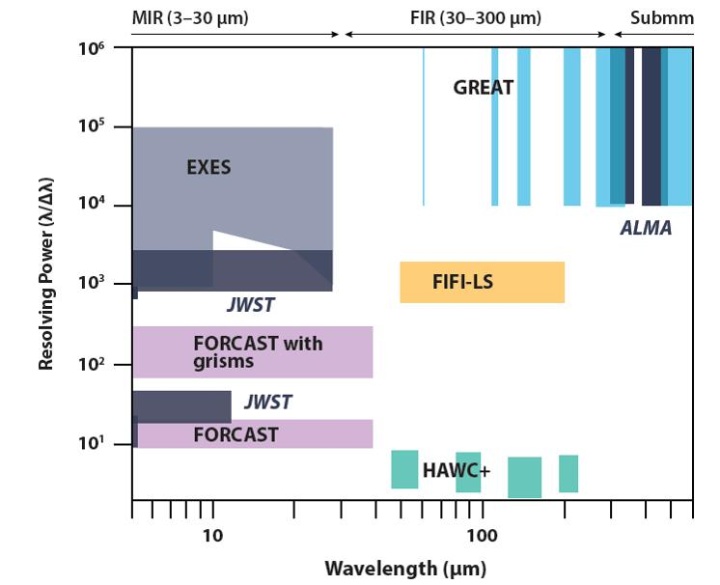On Thursday, April 28, 2022, the German Space Agency at DLR (Deutsches Zentrum für Luft- und Raumfahrt / German Aerospace Center) and the U.S.-American space agency NASA collectively announced to cease operations of the jointly operated flying observatory SOFIA (Stratospheric Observatory For Infrared Astronomy) no later than September 30, 2022.
The German SOFIA Institute (Deutsches SOFIA Institut, DSI) at the University of Stuttgart takes note of this announcement, but dissociates itself from the rationale for this decision, which is based on critical remarks about SOFIA in the Decadal Survey Report "Pathways to Discovery in Astronomy and Astrophysics for the 2020s." The Astro2020 report was released by the U.S. National Academies of Sciences, Engineering, and Medicine on Nov. 4, 2021, and contains recommendations for future projects and directions for space research in the United States.
Criticism of the decision by NASA & DLR
DSI's objective criticism concerns the following points:
- Considering its aim and purpose, the Decadal Survey is not designed to assess projects that are currently underway, but rather to assess the scientific potential of future projects, which is a distinctly different process. The national academy has been asked by NASA nonetheless to take a position on SOFIA in the Decadal Survey Report.
- The Decadal Survey's assessment is based on outdated information that was already two years old at the time of its publication.
- Due to the Decadal Survey, NASA canceled SOFIA's Senior Review on short notice, which was scheduled for March this year and explicitly recommended by NASA's own Astrophysics Advisory Committee. As a standard procedure for ongoing missions, a Senior Review would have been able to assess SOFIA's current performance in a scientifically appropriate manner.
- In contrast, no current information was collected for the Decadal Survey; instead, existing material as of 2019 was used.
- In September 2015, NASA unilaterally shortened the intended 20-year operational duration of SOFIA to a 5-year primary mission duration without further consultation with its partner, and has consequently been referring to a 3-year "extended mission" since June 2019. Such a view is neither in line with the agreements nor with the understanding of the SOFIA user community.
Although the criticisms of SOFIA expressed in the Decadal Survey were certainly appropriate considering the level of knowledge dating back to 2019, DSI would like to draw attention to the following points:
- SOFIA's U.S. science leadership has responded in a very proactive and dynamic manner, and in a very short time, to all of the criticisms raised in an internal NASA review in 2019. SOFIA's publication rate is now twice as high as it was three years ago, the observatory's observing efficiency and mission readiness have increased significantly, and the number of publications per observing hour is at a reasonable level considering the high technical complexity of observations in the far-infrared spectral range.
- The latest SOFIA status report "Future & Prospects" published in March shows that SOFIA has also become a successful mission on the U.S. side, and contrasts sharply with the assessments from the Decadal Survey.
- Scientists from German institutes are disproportionately successful in their use of SOFIA and the associated scientific output. The high demand for the two science instruments provided by Germany, and the comparatively much higher number of PhD theses, also indicate that SOFIA is a very successful mission, especially from a German perspective.
- Quite rightly, the German astronomical community stands fully behind SOFIA. The community's unreserved support is not only reflected in the memorandum "Perspectives of Astrophysics in Germany 2017-2030" published by the Council of German Observatories (Rat deutscher Sternwarten, RdS), which explicitly recommended the continuation and further development of SOFIA already in 2016. This support was reaffirmed in early 2022 in a letter by RdS to DLR, in which the German space agency was asked to represent the interests of the German astronomical community to NASA, and to advocate in particular for an up-to-date scientific assessment in the context of the originally planned Senior Review.
- The German SOFIA Science Working Group (GSSWG), the German space agency's scientific advisory body for SOFIA, pointed out that, in its view, a premature end to SOFIA would mean an unjustifiable loss of financial resources already invested and of know-how built up over the past decades.
DSI remains operational
So where do things go from here? "On the U.S. side, the final say on continued funding for the project rests with Congress, which is not expected to submit its budget proposal for 2023 until July," said Alfred Krabbe, head of DSI, which coordinates SOFIA operations on the German side. "In the past, Congress has always supported SOFIA." Krabbe bases his hope for at least one more year of operations primarily on the high investment costs on the U.S. side, which have not yet paid for themselves after eight years of operation so far. He also points out that SOFIA is currently the only observatory in the world that can cover the far-infrared wavelength range of the electromagnetic spectrum (currently up to 612 µm) and will remain so for the next 10-15 years. The recently commissioned James Webb Space Telescope (JWST) and SOFIA complement each other ideally. JWST is able to observe up to a wavelength of 27 µm; however, that is where SOFIA really begins. "JWST can in no way replace SOFIA," Krabbe emphasizes.
Opposition to the premature end of SOFIA operations is also growing in the U.S. community. NASA's Astrophysical Advisory Committee (APAC), in a letter dated April 18 of this year, has also already advised NASA against a hasty end to the SOFIA mission and called for the 2023 observing cycle to be carried out. Additionally, on May 3, there will be a NASA Townhall meeting to discuss, among other things, U.S. plans to end the SOFIA project including the lasting negative consequences of a hasty end to the SOFIA mission.
For the time being, DSI is awaiting the decision of the U.S. Congress and therefore remains prepared, for the time being, to ensure the operation of SOFIA and the German telescope with its team beyond September 30, 2022.
Weitere Links zur News:
- The airborne observatory SOFIA to end its mission after eight years of operations, DLR News vom 28. April 2022
- NASA, Partner Decide to Conclude SOFIA Mission, NASA News, April 28th, 2022
- Letter of NASA's Astrophysical Advisory Committee (APAC), April 18th, 2022
- Recent SOFIA Status report „Future & Prospects“, March 17th, 2022
- SOFIA – eine deutsch-amerikanische Erfolgsgeschichte (German), April 13th, 2022
- Denkschrift 2017 - Perspektiven der Astrophysik in Deutschland 2017 - 2030, August 2017
- Council of German Observatories
- German SOFIA Science Working Group (GSSWG)
Further SOFIA Links:
- SOFIA Science Center
- NASA SOFIA Missions Page
- SOFIA Mission Page of DLR Space Agency (German)
- DLR SOFIA Projekt Page
- DLR Blogs for SOFIA (partly in German)
- DSI Image Galery (German)
- News Overview (partly in German)
- Project Chronicle (German)
SOFIA, the "Stratospheric Observatory for Infrared Astronomy" is a joint project of the Deutsches Zentrum für Luft- und Raumfahrt e.V. (DLR; German Aerospace Center, grant: 50OK0901, 50OK1301, 50OK1701, 50OK1701 and 50OK2002) and the National Aeronautics and Space Administration (NASA). It is funded on behalf of DLR by the Federal Ministry for Economic Affairs and Climate Action based on legislation by the German Parliament, the State of Baden-Württemberg and the University of Stuttgart. Scientific operation for Germany is coordinated by the German SOFIA-Institute (DSI) of the University of Stuttgart, in the USA by the Universities Space Research Association (USRA).




